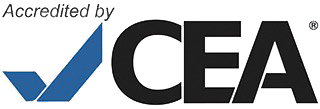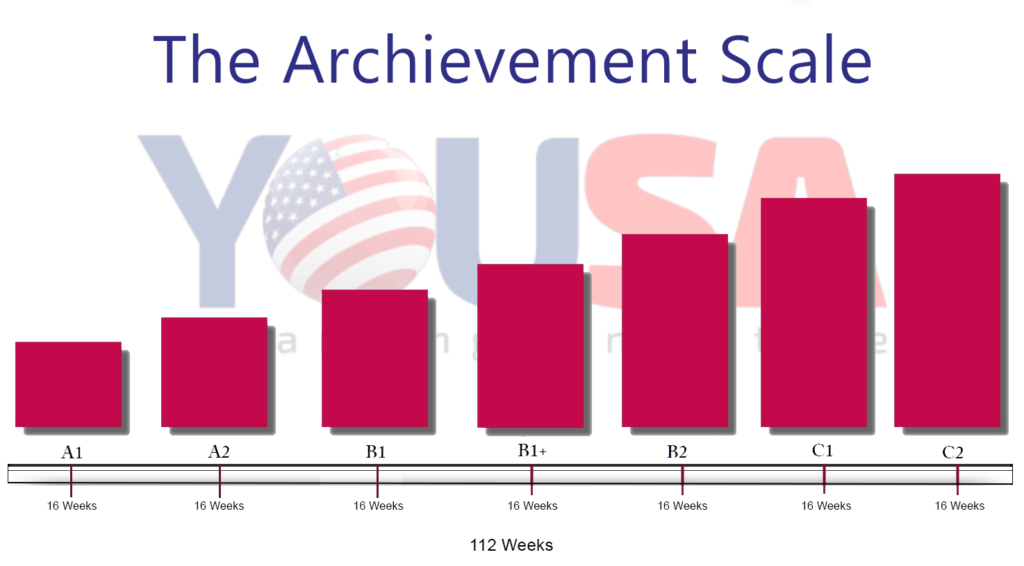Our Intensive program was designed for F-1 International students and offers integrated skills with a focus on communicative English including an emphasis on vocabulary, pronunciation and extra speaking practice. It offers 7 levels of English learning. Each level takes 16 weeks. Each term has 4 evaluation tests. Our complete Intensive Program has a total of 112 weeks.
Schedule
Monday to Thursday – 18 hours /week
Morning: 9am – 1h30pm
Evening: 6pm -10h30pm
Fridays and Saturdays: 8:30am to 1pm / 2pm to 6:30pm

Spoken Interaction
Students can interact in a simple way provided the other person repeats things slowly and helps with comprehension. They can ask and answer simple questions in areas of immediate need or on very familiar topics.
Spoken Production
Students can use simple phrases and sentences to describe what they do, where they live, and people they know.
Listening
Students can understand simple, standard speech which is very slow and is carefully articulated. They can recognize familiar words and very basic phrases about themselves, their family and immediate surroundings when people speak slowly and clearly.
Reading
Students can understand very short, simple texts and pick up familiar names and basic phrases.
Writing
Students can write a short, simple message or postcard, and they can fill in forms with personal details.
Spoken Interaction
Students can communicate in simple and routine tasks and give a simple and direct exchange of information on familiar topics and activities. They can handle very short social exchanges, but keeping the conversation going is difficult.
Spoken Production
Students can use a series of phrases and sentences to describe in simple terms family and other people, living conditions, educational background, and present or most recent jobs.
Listening
Students can understand clear, slow, standard speech related to areas of most immediate personal relevance. They can catch the main point in short, clear, simple messages and announcements.
Reading
Students can understand short, simple texts containing high frequency vocabulary and shared international expressions. They can find specific, predictable information in simple everyday material such as advertisements, notices and timetables.
Writing
Students can write short, simple notes and messages relating to matters in areas of immediate need. They can link a series of simple phrases and sentences with simple connectors like ‘and’, ‘but’ and ‘because’. They can write a very simple personal letter.
Spoken Interaction
Students can use a wide range of simple language in most situations likely to arise while traveling, shopping, eating out, etc. They can enter unprepared into conversation on topics that are familiar, of personal interest or pertinent to everyday life.
Spoken Production
Students can speak comprehensibly in order to describe experiences and events, dreams, hopes and ambitions. They can briefly give reasons and explanations for opinions and plans and can narrate a story or relate the plot of a book or film and describe reactions.
Listening
Students can understand the main points of clear standard speech on familiar matters regularly encountered in work, school, leisure, etc. They can understand the main point of many radio or TV programs on current affairs or topics of personal or professional interest when the delivery is relatively slow and clear.
Reading
Students can understand factual texts on subjects related to their interests that consist mainly of high frequency everyday or job-related language. They can recognize significant points in straightforward newspaper articles on familiar subjects and can understand the description of events, feelings and wishes.
Writing
Students can write simple texts on topics which are familiar or of personal interest by linking a series of shorter discrete elements into a linear sequence. They can write personal letters describing events, experiences and impressions.
Spoken Interaction
Students can use a wider range of language to communicate opinions, ideas, and tell stories using a mix of time frames. They can communicate in a more natural way in a number of different situations, including formal and informal language depending on the situation and context. They can recognize the difference between formal and informal English and express themselves appropriately and use richer language for exclamations and emphasis, as well as real or imagined conditions.
Spoken Production
Students can speak intelligibly for more extended periods in order to describe opinions, dreams, hopes, and ambitions. They can give reasons and explanations for opinions and plans and begin to self-correct errors, putting into practice known structures and showing awareness in accuracy. They can use richer vocabulary, expressing themselves with more confidence on topics outside of the daily norms, although limitations may still cause some repetition. They are also able to articulate better, causing less miscommunication.
Listening
Students can understand natural, fluidly spoken English on a topic of which they have some awareness. They can understand a variety of different accents, as well as listen for detail, as well as understand more naturally, being able to follow a tv show or movie, although details and colloquial language may still escape them.
Reading
Students can understand texts that are longer and more involved than a shorter, basic text and read for detail, skim, scan, predict and infer. They can process information from a text and communicate the main ideas, as well as most details. They are able to give their opinions and debate controversial topics they have read about, as well as understand texts regarding both real and hypothetical situations.
Writing
Students can write longer, more formal texts, including a resume, cover letter, a survey and a report on the survey findings although they may still make errors in more formal language. They can write a short story using mixed verb tenses and find and correct a variety of their own mistakes in grammar and language use.
Spoken Interaction
Students can interact with a degree of fluency and spontaneity that makes regular interaction with native speakers quite possible.They can take an active part in discussion in familiar contexts and account for and sustain views clearly by providing relevant explanations and arguments.
Spoken Production
Students can present clear, detailed descriptions on a wide range of subjects related to their field of interest. They can expand and support ideas with subsidiary points and relevant examples, as well as explain a viewpoint on a topical issue giving the advantages and disadvantages of various options.
Listening
Students can understand standard speech spoken at a normal rate and follow even complex lines of argument provided the topic is reasonably familiar. They can understand the essentials of lectures and most TV news and current affairs program, as well as the majority of films in standard dialect.
Reading
Students can understand articles and reports concerned with contemporary problems in which the writers adopt particular stances or viewpoints. They can understand contemporary literary prose and adapt style and speed of reading to different texts and purposes. They can also use appropriate reference-sources selectively.
Writing
Students can write clear, detailed text on a wide range of subjects related to their interests. They can write an essay or report, passing on information or giving reasons in support of or against a particular point of view and write letters highlighting the personal significance of events and experiences.
Spoken Interaction
Students can express themselves fluently and spontaneously and use language flexibly and effectively for social and professional purposes. They can formulate ideas and opinions appropriately and relate contributions skillfully to those of other speakers.
Spoken Production
Students can present clear, detailed descriptions of complex subjects, integrating sub-themes and develop particular points and finish with an appropriate conclusion.
Listening
Students can understand lectures and discussions on complex topics beyond their own field, though they may need to confirm occasional details, especially if the accent is unfamiliar. They can understand even when the talk is not clearly structured and when relationships are only implied and not signaled explicitly.
Reading
Students can understand long and complex factual and literary texts, appreciating distinctions of style. They can also understand specialized articles and longer technical instructions, even when they do not relate to their field.
Writing
Students can write clear, well-structured texts and express points of view at some length. They are able to write detailed expositions of complex subjects in a letter, an essay or a report, underlining the salient issues. They can also write different kinds of texts in a style appropriate to the reader in mind.
Spoken Interaction
Students can take part effortlessly in a conversation or discussion on any topic and have a strong command of idiomatic expressions and colloquialisms. They can express themselves fluently and convey finer shades of meaning with precision. They can error correct so naturally that listeners are hardly aware of it.
Spoken Production
Students can present a clear, smoothly flowing description or argument in a style appropriate to the context and with an effective logical structure which helps the recipient to notice and remember significant points.
Listening
Students have no difficulty in understanding any kind of spoken language, whether live or broadcast, even when delivered at fast native speed, provided they have some time to get familiar with the accent. They can follow specialized lectures and presentations employing a high degree of colloquialism, regional usage, or unfamiliar terminology.
Reading
Students can read with ease virtually all forms of the written language, including abstract, structurally or linguistically complex texts such as manuals, specialized articles and literary works. They can understand and interpret critically virtually all forms of the written language including abstract, structurally complex, or highly colloquial literary and non-literary writings. They can understand a wide range of long and complex texts, appreciating subtle distinctions of style and implicit as well as explicit meaning.
Writing
Students can express themselves with clarity and precision, relating to the addressee flexibly and effectively in an assured, personal, style. They can write clear, smoothly flowing text in an appropriate style. They can write complex letters, reports or articles, which present a case with an effective logical structure, which helps the recipient to notice and remember significant points. They can write summaries and reviews of professional or literary works.
Business Specific Outcomes
Students will be able to use business-focused idiomatic expressions, both in speaking and writing, so they can perform effectively and efficiently in work-related situations requiring specialized language and problem-solving skills. Their overall ability to produce a natural and sophisticated use of the language will improve and their use of more diplomatic language in Business English will be enhanced. They will be able to take part in real life business case studies, presentations, meetings, conference calls, negotiations and discussions, pitches, customer service activities, and provide feedback to customers and employees.

Placement Test
Upon arrival, students will take a Placement Test (written and oral) to assess their knowledge of the English language. Students will be placed into the class level based on the results of their placement test.
Orientation Session
Before starting the classes, students participate in an Orientation Session, in which they are given all student-related materials, including their course schedule and school’s policies.
Hunter’s Creek
12200 Menta St. suite 110,
Orlando, Florida – 32837
Metrowest
1507 Park Center Dr, suite 1H
Orlando, Florida – 32835